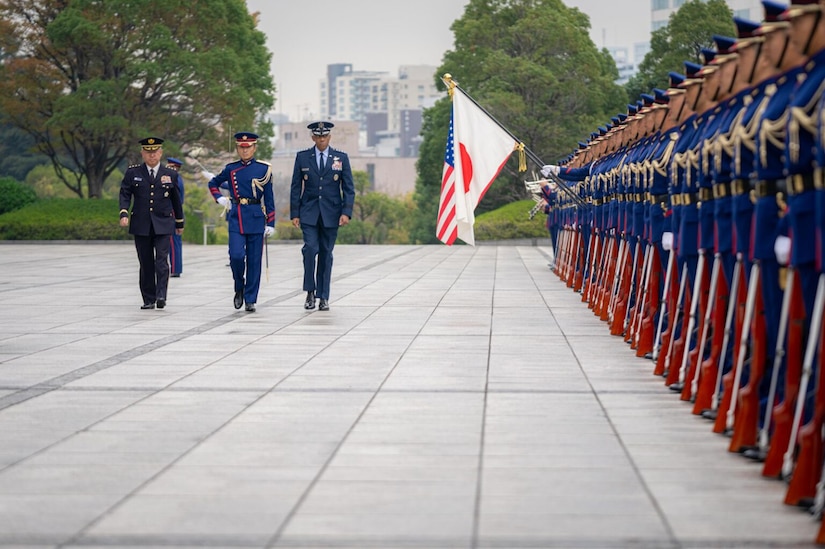Chairman of the Joint Chiefs of Staff Air Force Gen. CQ Brown, Jr., will build upon U.S. investments in partnerships throughout the Indo-Pacific this week as he meets with key allies on his second trip to the region since taking office.
Brown arrived in the Philippines today where he will participate in a series of engagements alongside Philippines armed forces Chief of Staff Gen. Romeo Brawner Jr. and other military officials amid recent strides in the long-standing U.S.-Filipino defense relationship.
Later in the week, the chairman will travel to Japan to meet with senior government officials and military leaders for discussions on regional deterrence and security cooperation. Brown will also meet with U.S. service members stationed at Yokota Air Base.
Underpinning the engagements, Brown said, is the U.S. commitment to continue deepening ties and building trust with allies throughout the region.
“In the Philippines, we have a long-standing, shared interest in regional stability that’s backed by international law,” Brown said while previewing this week’s engagements. “The Philippines is one of our oldest treaty allies in the region.”
Robust partnerships with key regional allies remain central to the United States’ approach to advancing a shared vision of a free and open Indo-Pacific amid increased competition with China — the United States’ pacing challenge — and threats posed by North Korea.
These partnerships are accelerating throughout the region. The U.S. has made significant strides in deepening U.S.-South Korean security cooperation and extended deterrence. That is outlined under the April 2023 Washington Declaration, which marks the 70th anniversary of the U.S.-South Korean alliance and recommits to developing an ever-stronger mutual defense relationship.
The U.S. has also led efforts to deepen trilateral cooperation with Japan and South Korea grounded in a commitment to advance a shared vision of peace and prosperity, as outlined during the August 2023 summit among President Joe Biden, Japanese Prime Minister Fumio Kishida and South Korean President Yoon Suk Yeol at Camp David.
NATO has also expanded its partnership with key allies in the Indo-Pacific. The transatlantic alliance hosted high-level meetings with key partners in the region, including Australia, Japan, New Zealand and South Korea at this year’s NATO summit in Washington.
Defense leaders have said the United States’ investments in deepening ties throughout the region will continue to pay dividends for years to come.
At this year’s International Institute for Strategic Studies’ Shangri-la Dialogue in Singapore, Secretary of Defense Lloyd J. Austin III highlighted the transformative impact this broadening network of partners is having on the region.
“Today, we are witnessing a new convergence around nearly all aspects of security in the Indo-Pacific,” Austin said. “And this new convergence is producing a stronger, more resilient, and more capable network of partnerships. And that is defining a new era of security in the Indo-Pacific.”
Brown, who first visited the Philippines in 1987 as a junior officer, said he has watched the partnership grow over the past nearly 40 years and further accelerate in more recent years.
He noted the growth of Balikatan, an annual exercise hosted by the Philippines designed to strengthen interoperability and cooperation with the U.S. This year marked the 39th iteration of the Balikatan, the largest on record with approximately 16,000 U.S. and Philippine military personnel participating. It also included Australian and French troops and representatives from another 14 countries who took part as international observers.
Brown also noted the expansion of U.S. rotational access to four new sites in the Philippines in 2023 under the Enhanced Defense Cooperation Agreement. The nine total sites under the agreement are designed to strengthen combined training, exercises, and interoperability between the two countries. Brown will tour one of the EDCA sites during his visit.
“I do see that the relationship is gaining momentum,” Brown said, adding that Philippine relationships with other regional allies are also growing.
“I think it’s a positive trajectory,” he said.
Brown’s trip to the Indo-Pacific follows key engagements with his global counterparts during the NATO summit and during last month’s African Chiefs of Defense Conference in Botswana.
His engagements with his counterparts in the Indo-Pacific, as with those in regions throughout the globe, are “a key part of a partnership and building trust with our allies and partners,” Brown said.









